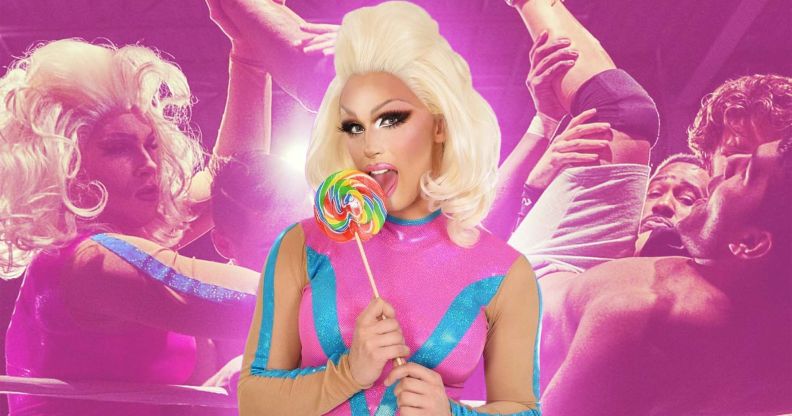Drag wrestler Alice Starr wants to ‘indoctrinate’ people – ‘to be not as hateful’

Drag wrestler Alice Starr says her only agenda is to ‘make people love each other more’. (Instagram/@officialalicestarr)
Canada’s first and only drag wrestler Alice Starr has an agenda.
It’s hard to navigate the internet at the moment without being confronted with hateful allegations of drag queens and trans people “indoctrinating” children by simply existing.
It’s a tired repeat of the moral panics that have targeted LGBTQ+ folks and other marginalised people throughout history.
In the 1970s, anti-LGBTQ+ crusader Anita Bryant led a dedicated, bigoted campaign to limit the legal rights of queer people – all in the name of protecting children.
This demonisation continued into the 80s as the media was flooded with headlines describing the AIDS crisis as a “gay virus plague” – in the same hysterical tone that drag performers are right now being labelled “groomers”.
Alice Starr, Canada’s only drag wrestler, tells PinkNews that the only “indoctrination” they’re interested in is to encourage people “to be not as hateful”.
“If there’s anything that I’ve got an agenda on, it’s to make people love each other more,” Starr says.
“I’ve got opportunities within the wrestling world. There’s an obvious symbolism of fighting someone in that squared circle, where there is an opponent and there are hurdles.”
“And oftentimes, that’s someone who dislikes your character or dislikes you personally, and the audience has to buy into that.
“There’s no buying into what I’m doing. It is the truth when I’m wrestling.”
Alice wrestles in full drag. The two art forms are often thought of as artifices – filled with choreographed fights, spandex costumes and stunts.
But for Starr, “Tyler [their legal name] and Alice are the same thing. Alice is in the ring. Alice is here right now. But they’re not personas. They’re extensions of me.”
Putting themselves out there isn’t easy, especially given the “really terrifying” climate for LGBTQ+ people and drag performers around the world.
But they have to find a “way to turn that terror into motivation”, like focusing on their child’s future.
“What really motivates me is the fact that I have a son, and he’s so young and knowing that I want a world that he can grow up in, where he can be and do whatever he wants,” Starr says.
“And if I can even be a small piece of the change that the world sees, then I’ve done my job, and I can deem this whole endeavour successful.”
Drag culture has moved into the mainstream where it has become a multimillion dollar industry, spanning from Drag Race to Disney movies.
Yet, homegrown drag events are longer simple affairs in the US and even Canada, where Alice Starr calls home.
In March, a Canadian public library cancelled a family-friendly drag storytime event after staff received threats and hate online. Just a few days later, in Ontario, drag performers were interrupted while singing nursery rhymes with kids and reading books to them by conservatives shouting bible passages.
In April, Ontario New Democratic Party urged the government to create community safety zones to protect drag artists and LGBTQ+ people from harassment and intimidation at their performances. In the US, some states have succeeded in legally restricting drag.
Alice Starr has felt this first-hand. They say bans in Tennessee and Florida have “severely affected” their career.

They add there’s still “stigma and hate within the wrestling world when it comes to queer people” which has been diminishing in recent years.
Despite the terrifying situation for the drag and LGBTQ+ communities, they say it’s been “extremely fulfilling” to be some wrestling fans’ first experience with a drag artist or queer person.
“I’ve always been someone that loves to push back and be a little against the grain,” Starr says.
“I quickly found out that the wrestling world is not only unforgiving, but it can be super scary because these people can see you as an outsider.
“Despite the similarities, the over the top persona of drag, and everybody loves drag. We could date back to Bugs Bunny and Dame Edna, so many other depictions – Mrs Doubtfire … It’s just showcasing that the idea of it is not that foreign.
“And so now being in the wrestling world and being in front of people, I represent drag for the first time in their eyes. They’ve never seen a drag queen perform.
“So there’s a certain sense of responsibility that is scary, but I also welcome it because someone has to do it.
“Someone has to make a change in the wrestling world, and wrestling needs to be more inclusive. And I think this is a great opportunity to do it through storytelling.”
How did this story make you feel?

